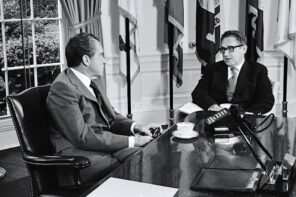On Martin Luther King Jr. Day, the governor of Alabama, Robert Bentley, gave a speech from the pulpit of the Dexter Avenue Baptist Church, the pulpit which once belonged to King. That was his first mistake. Few public figures have blended language religious and political with King’s skill, and Bentley is not among them. This became obvious with his second mistake: when he said, “So anybody here today who has not accepted Jesus Christ as their savior, I’m telling you, you’re not my brother and you’re not my sister, and I want to be your brother.”
Bentley’s comments drew complaints. On Salon, Justin Elliott called Bentley’s words “oddly exclusionary” and compared them to former Mississippi governor Kirk Fordice’s 1992 declaration that the United States is a Christian nation. Placed in the context of Bentley’s broader remarks, however, such a politicized reading of his words seems strange. They came in the midst of an address in which the new governor celebrated and sought to claim King’s mantle of color-blindness; he also stated that though he was elected as a Republican he would be “the governor of all the people.” It doesn’t make sense that he would suddenly pivot from such pleasing bromides to embrace divisiveness and exclusion. Indeed, it seems politically suicidal.
So if it didn’t make sense as political rhetoric, what was it? Looked at it another way, Robert Bentley was simply repeating common evangelical doctrine; evangelicals, those Protestants who insist upon the importance of being “born again” use such familial language to refer to other members of their spiritual community. That is, for a moment, Bentley was not speaking the language of politics, but the language of evangelical Protestantism, not as a politician, but a pastor of a faith whose theological rhetoric frequently bears little resemblance to the language of contemporary American politics.
Critics, particularly those on the political left, understand Bentley’s remarks in terms of their politics, focusing on what they understand to be the socially prescriptive and even bigoted nature of the conservative right. The Jewish Anti-Defamation League, for instance, stated that Bentley’s remarks “raise serious questions as to whether non-Christians can expect to receive equal treatment during his tenure as governor.”
And here is the problem. Perhaps, but also perhaps not. Certainly, Bentley’s statements remind us of older strains of American political thought, strains which seem increasingly anachronistic and even threatening today; as the historian Rogers Smith has observed, liberalism in America has always coexisted uneasily with republican ideologies that emphasized virtue and duty rather than rights — and versions of Americanism that defined citizenship in terms of race or gender. These philosophies may seem foreign today, but are as rooted in the American experience as contemporary liberalism is. That Bentley could so seamlessly weave his convictions about human equality with the utter need for redemption in Jesus indicates that his version of liberalism is tempered by another strand: the religious version of Americanism, the frequently evangelical nineteenth century strain which understood what it meant to be American in terms of the opportunities for sanctification of individual and nation — echoed through the language of American politicians from Adams to Lincoln to McKinley and into the Cold War.
And there’s the conundrum. Is there a place for rhetoric like Robert Bentley’s—rhetoric that gets uncomfortably more specific than the generic references to divine favor and just gods that make up American civil religion—in American politics today? Bentley himself, despite his worldview, seemed to wonder. Standing behind a pulpit, he seemed to slip for a moment from politician to pastor; he, almost awkwardly, seemed to understand that there is in America today a difference but at the same time to believe that it was his responsibility to at that moment be both. His response to criticism sought to reassure with the language of inclusivity, equality, and government of all the people. It is a mark of the nature of contemporary American cultural pluralism that Bentley seems aware of his slip. But it may also be such a mark that Americans like Bentley will continue to flourish, saying things like what he said this week. Maybe it’s in the very controversy such moments will always engender that America itself lives.




